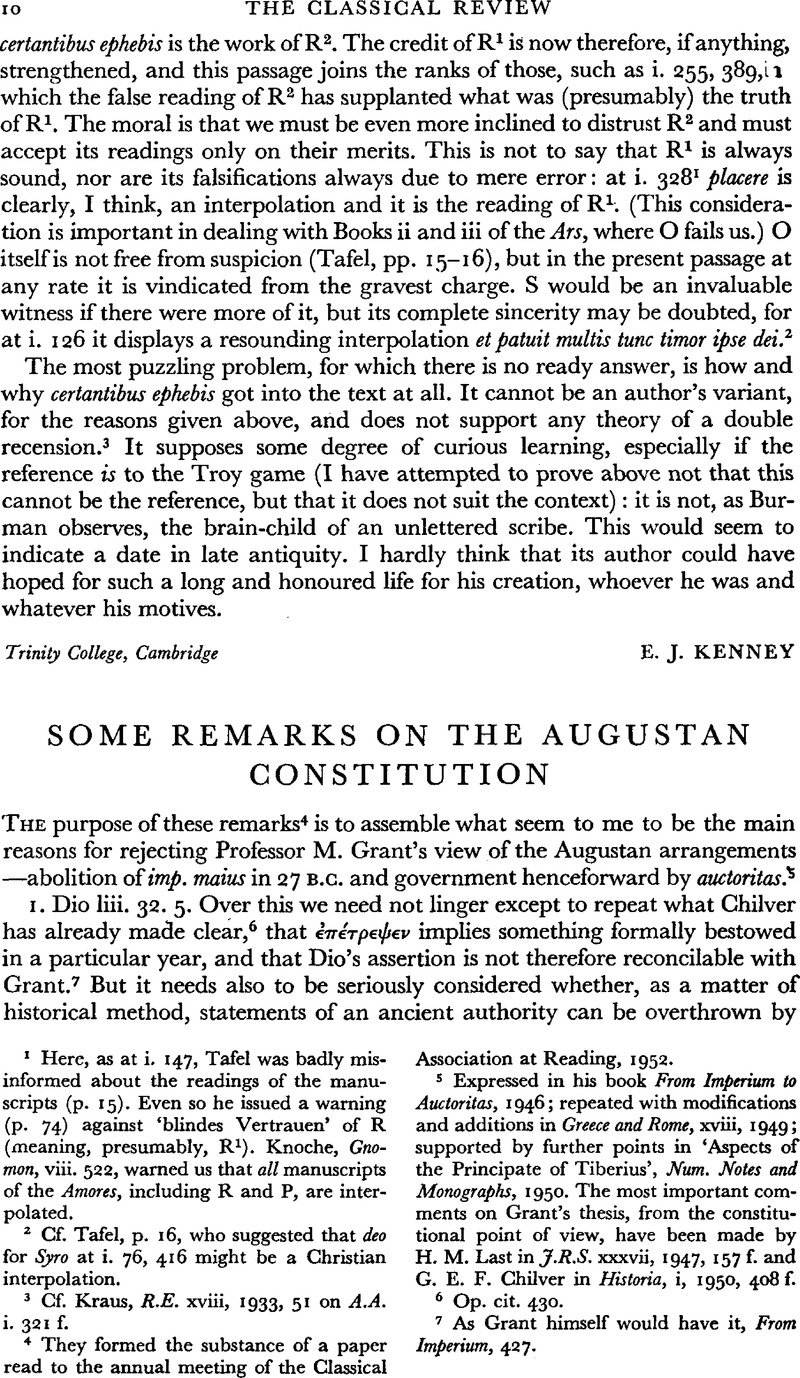Article contents
Some Remarks on the Augustan Constitution
Published online by Cambridge University Press: 13 February 2009
Abstract

- Type
- Review Article
- Information
- Copyright
- Copyright © The Classical Association 1953
References
page 10 note 1 Here, as at i. 147, Tafel was badly mis informed about the readings of the manuscripts (p. 15). Even so he issued a warning (p. 74) against ‘blindes Vertrauen’ of R (meaning, presumably, R1). Knoche, Gnomon, viii. 522, warned us that all manuscripts of the Amores, including R and P, are interpolated.
page 10 note 2 Cf. Tafel, p. 16, who suggested that deo for Syro at i. 76, 416 might be a Christian interpolation.
page 10 note 3 Cf. Kraus, R.E. xviii, 1933, 51 on A.A. i. 321 f.
page 10 note 4 They formed the substance of a paper read to the annual meeting of the Classical Association at Reading, 1952.
page 10 note 5 Expressed in his book From Imperium to Auctoritas, 1946; repeated widi modifications and additions in Greece and Rome, xviii, 1949; supported by further points in ‘Aspects of the Principate of Tiberius’, Num. Notes and Monographs, 1950. The most important comments on Grant's thesis, from the constitutional point of view, have been made by H. M. Last in J.R.S. xxxvii, 1947, 157 f. and G. E. F. Chilver in Historia, i, 1950, 408 f.
page 10 note 6 Op. cit. 430.
page 10 note 7 As Grant himself would have it, From Imperium, 427.
page 11 note 1 See Last, op. cit. 163.
page 11 note 2 Staatsrecht i.3 124.
page 11 note 3 See, inter alias, Momigliano in Bull. Com. lviii, 1930, 42 f.; M. Levi in Riv. Fil., N.s. x, 1952, 207 f.; de Francisci in Atti delta Reale Accad. Italiana, Mem. d. classe di scienze morali e storiche, Ser. vii, vol. ii, 1941, 9–11.
page 11 note 4 ‘Aspects of the Principate of Tiberius’, 48.
page 11 note 5 Note that it required a host of Greek words to capture the varying significances of auctoritas, and sometimes only a transliteration would do.
page 11 note 6 Cicero several times couples sententia and auctoritas.
page 11 note 7 Cf. Res Gestae 8. 5, ‘legibus novi[s] m[e auctore l]atis’, where the Greek has simply εἰσαγαγών καινοὺςνόμους
page 11 note 8 Phil. i. 1. 3.
page 11 note 9 Naturally, where proposals are not in question, ex auctoritate Caesaris may mean ‘on the Emperor's authority’; it probably does so, for example, in the case of the ius respondendi ex auctoritate Caesaris.
page 11 note 10 De aquaed. 104. 2. The unratified s.c. was called senatus auctoritas; this is in all probability different from the common prestige sense of senatus auctoritas, and means the sum of the senators' sententiae, their combined sententia.
page 12 note 1 Op. cit. 425.
page 12 note 2 The phrases consulum auctoritas, proconsulis auctoritas axe common, and Livy more than once has auctoritas imperatoris.
page 12 note 3 Auctoritate praestiti is abl. of respect, not of cause; see Last in J.R.S. xl, 1950, 120 (the whole of these remarks, a review of MagdeIain's Auctoritas Principis, are of great value and importance).
page 12 note 4 Dio liv. 3. 2–4. See Volkmann, Zur Rechtsprechung im Principal des Augustus, 53 f.; Syme, The Roman Revolution, 333, 341; Grant, From Imperium, 83 f. I know of no evidence for the name Antonius, which Grant (misled perhaps by McFayden or the index to the C.A.H.) gives to Primus.
page 12 note 5 See Last in J.R.S. xxxvii, 1947, 160.
- 1
- Cited by




